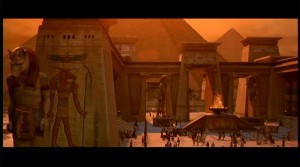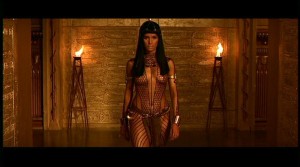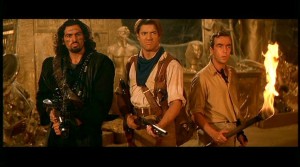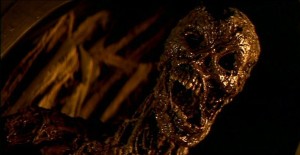A very far cry from the Franz Kafka novel of the same title, this faux populist Australian comedy, Miramax to the max, is a prime example of how readily that country’s intermittent self-hatred can be translated into box office: it reportedly grossed more than any other Australian movie in 1997. A sweet-tempered and terminally dim tow-truck driver and family man (Michael Caton) refuses to sell his house to allow for an airport extension, fights his cause all the way up to the supreme court, and guess what? The little man triumphs. Director Rob Sitch is no Capra and none of his three writers comes close to Robert Rifkin, but if what you’re looking for is another opportunity to feel simultaneously superior to and affectionate about hicks, then I guess this is your movie. With Anne Tenney, Stephen Curry, Sophie Lee, Anthony Simcoe, and Charles Bud Tingwell. 84 min. (JR) Read more
Jafar Panahi followed his debut feature, The White Balloon, with this 1997 story of a little girl in downtown Tehran who waits for her mother to pick her up from school and eventually decides to make her way home alone; finally Panahi shifts his focus to the making of the film itself. If you haven’t seen any Iranian pictures this may seem fresh, but if you know Abbas Kiarostami or Mohsen Makhmalbaf it’s likely to seem familiar. Kiarostami furnished the story for The White Balloon, and without his input Panahi seems stuck for a resolution to the narrative, though his documentary-style handling of both actors and everyday street life remains acute. (JR) Read more
An intelligent and informative feature-length documentary (1999) by Canadian filmmaker Nettie Wild about the Zapatista movement and uprising in southern Mexico, concentrating on events that occurred between 1994 and 1997. The film focuses mainly (and cogently) on the struggles of the Zapatista National Liberation Army in Mexico and in cyberspace, but it also allows the government-allied paramilitary group north of Chiapas, which calls itself Peace and Justice, to speak on its own behalf (when it isn’t assaulting the film crew). This is sturdy as well as stirring political filmmaking that asks all the right questions, including ones about the role of the U.S. in the outcome. 89 min. (JR) Read more
Tom Cudworth’s script about the lives and loves of theater and music hopefuls working at a Hoboken restaurant is pretty familiar stuff, but the performancesby Adrien Brody, Elise Neal, Simon Baker-Denny, and Lauryn Hillare relatively fresh and sincere. The main strand of the story involves a relationship between a white playwright (Brody) and a black singer (Neal), but the secondary characters are as well-defined as the leads. Eric Bross directed this 1998 independent feature.107 min. (JR) Read more
Activist-filmmaker Maggie Hadleigh-West got so tired of being stared at and harassed on the street that she decided to fight back and started filming as well as interrogating the men bugging her. Usually she held one camera while behind her a camerawoman held another, and she carried out this counteraggression in several American cities, meanwhile recounting the experiences of other women who didn Read more
A daydreaming teenager (Donald Adeosun Faison) nearing graduation is the hero of this feeble and routine African-American comedy, a sort of Secret Life of Walter Mitty reconfigured for the teen market. Written by Gary Hardwick and directed by David Raynr; with Maia Campbell, Deon Richmond, and Guy Torry. (JR) Read more
From the Chicago Reader (May 1, 1999). — J.R.


Not just a remake of the Boris Karloff-Karl Freund classic but an Indiana Jones spin-off with dollops of Jason and the Argonauts, George Romero’s zombie series, Land of the Pharaohs, Samson and Delilah, and even Apocalypse Now (Arnold Vosloo’s mummy bears a certain resemblance to Brando’s Kurtz). Writer-director Stephen Sommers does a pretty good job of zipping things along and occasionally scaring us, and the digital effects are fun; Brendan Fraser, John Hannah, and Jonathan Hyde do what they can with one-dimensional parts but tend to be outshone by the almost two-dimensional Rachel Weisz. Kevin J. O’Connor is mainly embarrassing as a conniving Arab, but then all the Arabs in this 1999 film, set during the 1920s, are accorded roughly the same respect, affection, and humanity as black people in The Birth of a Nation. Thanks to the example of Lucas-Spielberg, guiltless colonialism backed by endless gun power is still the name of the game. PG-13, 124 min. (JR)

 Read more
Read more
Set during the final days of World War II on a Japanese island containing a factory and prison camp, this late (1998) feature by Shohei Imamura is a serious yet cockeyed farce about a comically obsessed middle-aged doctor (Akira Emoto, the creepy con in The Eel) who makes the rounds of the island convinced that a hepatitis epidemic is sweeping Japan and his motley gang of helpers, which includes a young prostitute, a drunken and licentious monk, and a morphine-addicted surgeon. Beautifully realized on every level, this is a masterpiece that manages to combine low comedy and earthy humanity with apocalyptic profundity and terse wisdom; it’s not just a portrait of Japan in general and a closely knit community in particular, but a rousing black comedy about life and the world. In Japanese with subtitles. 128 min. (JR) Read more
Sincere and lachrymose, directorially ham-fisted, and terminally sappy, Roberto Benigni’s 1997 movie about Italian fascism and the Holocaust makes Schindler’s List look like social realism. The simple plot concerns a simple, good-hearted, and partly Jewish dreamer (Benigni), the proper schoolteacher he woos and marries (Nicoletta Braschi, Benigni’s real-life wife), and their little boy. The first half or so coasts along on a certain amount of charm attached to Benigni’s charismatic mugging, but when father and son wind up at a concentration camp and the father contrives to explain their hardships in terms of an invented game, the indifference of the proceedings and the hero’s slapstick behavior to the everyday realities of the camps borders on the nauseating. In Italian with subtitles. 116 min. (JR) Read more
This first feature by Erick Zonca is more typical than exceptional as an example of French cinema’s recent trend toward realistically depicting regional life, and its sex scenes have been trimmed to satisfy the puritanical, studio-run Motion Picture Association of America (which wouldn’t dream of interfering with the genocidal mayhem of the blockbusters). But this story of the wavering friendship between two young working-class women who meet at a clothing factory in Lille (Elodie Bouchez and Natacha Regnier) is well worth a look, above all for its nuanced performances. Bouchez and Regnier deservedly shared the best-actress prize at Cannes last year, and most of the secondary characters are equally well realized (I especially liked the concert and nightclub bouncer played by Patrick Mercado). But what really holds this film together is its fidelity to the ways people live and relate to one another, a realism seldom offered by commercial American fare. Music Box, Friday through Thursday, April 30 through May 6.
–Jonathan Rosenbaum
Art accompanying story in printed newspaper (not available in this archive): film still. Read more
A father invites his estranged son and the son’s friends to a weekend at his ski lodge, in a stupefyingly awful, in-your-face independent comedy that makes Where the Boys Are look like Love’s Labour’s Lost. Robert Downey Jr. turns up sporting a very phony and unfunny Bavarian accent that is exercised, like our patience, at great length, and the sophomoric sex gags (gay as well as straight) would do dishonor to a frat-house video. Directed by George Haas, who scripted it with Neill Barry. With Stephen Baldwin, Danny Nucci, George Newbern, Claudia Schiffer, Alison Eastwood, and Suzanne Cryer. (JR) Read more
Sean Connery remains the closest thing we have to Cary Grant, which helps to explain why he often gets teamed with leading ladies a third his age. But he brings off the conceit with more polish than Clint Eastwood, and it’s the romantic sparring with Catherine Zeta-Jones as another glamorous thiefnot the unsuspenseful heiststhat makes this silly thriller lightly bearable. The multiple double crosses tend to be more fun, if no less predictable, than the hyperbolic action sequences because the stars are more at ease (and we’re not watching stunt doubles). Some of the locations (London, rural Scotland, Kuala Lumpur) add spice to the mixture, and Ving Rhames and Will Patton provide the formulaic secondary cast. Jon Amiel directed the script by Ron Bass and William Broyles. (JR) Read more
Though this comedy-drama about a macho feud between two New York air-traffic controllers (John Cusack and Billy Bob Thornton) is never entirely believable, it’s consistently lively, offbeat, and unpredictable, suggesting at times the improbable fusion of Howard Hawks and Sigmund Freud. Inspired by an article by Darcy Frey in the New York Times Magazine, the screenplay by brothers Glen and Les Charles (creators of the TV show Cheers) piles hyperbole on top of frenzy in spelling out the heroes’ frenetic lifestyle. In particular, it focuses on the putative wife swapping (involving Cate Blanchett and Angelina Jolie) that emerges from the rivalry. Cusack may be called upon to hog too much of the limelight, if only because the story is mainly told from his point of view, but director Mike Newell’s flair for mixing and matching his entire cast seldom falters. (JR) Read more
From the looks of it, screenwriter and costar James McManus based his story and its details on a sizable reading list of novelists: not only Malcolm Lowry and Graham Greene (both cited in the dialogue), but also James M. Cain and probably David Goodis to boot. The story involves a would-be American novelist (Eric Roberts) who finds himself broke and stranded in a Mexican village. He falls in love with a 17-year-old local (newcomer Tara Crespo) he’s never met, and gets hired by another gringo (McManus), who’s working for a local philanthropist (Joaquim de Almeida), to settle a grudge match by killing another wealthy local (Victor Rivers). The dialogue tends to be wordy and pretentious, but the actors are resourceful enough to keep this watchable and the plot has a reasonable number of twists; Jack Perez is the director. (JR) Read more
Funny as well as poignant, this 1999 comedy stars Eddie Murphy and Martin Lawrence as New York bootleggers sentenced to life in a Mississippi prison after being framed for murder in 1932. This might be better than anything either comedian has done before; at least it made me laugh more. A movie about black men in prison comes dangerously close to being a movie about contemporary reality, and part of what I like about Robert Ramsey and Matthew Stone’s episodic screenplay and Ted Demme’s mainly self-effacing direction is how many real-life issues it manages to broach without ever threatening to become pompous. Character humor growing out of adversity has a long and venerable tradition, and if this in part suggests a street-smart Forrest Gump, it also recalls the euphoric gusto of W.C. Handy’s song Long Gone as performed by Louis Armstrong. As is expected by now in a Murphy movie, the makeup effects (handled by the ace Rick Baker) are elaborate, but little of this is asked to replace performance; Murphy and Lawrence and the secondary cast, which includes Obba Babatunde, Bokeem Woodbine, Ned Beatty, and R. Lee Ermey, all do a fine job. (JR) Read more




